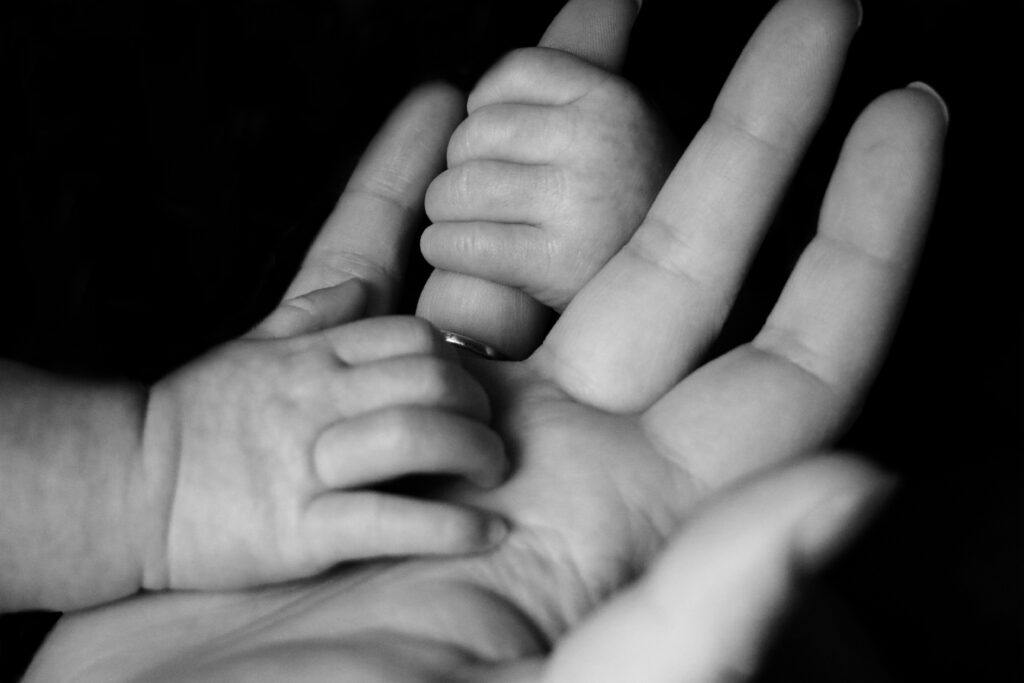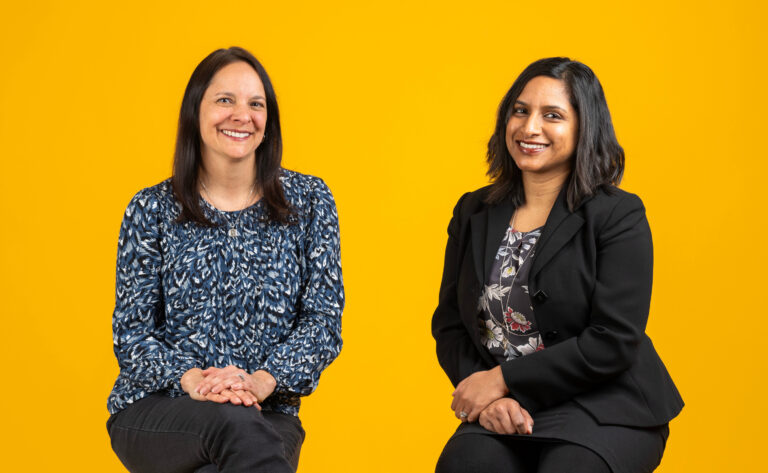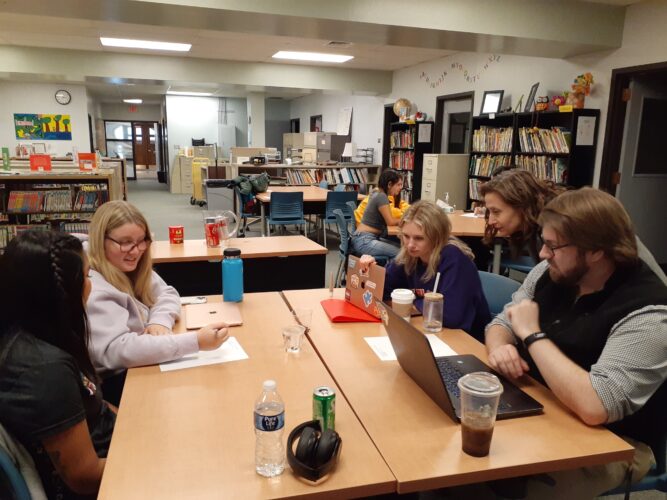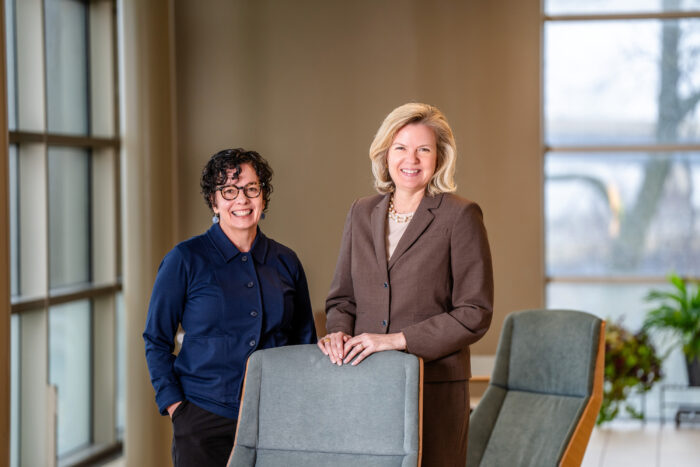Two professors in Marquette’s College of Education are at the center of a cross-disciplinary project aimed at supporting new and expecting mothers’ mental health. Dr. Kavitha Venkateswaran, clinical assistant professor of counseling education and counseling psychology, is the project’s principal investigator, and Dr. Lisa Edwards, professor and director of training for counseling psychology, is a primary collaborator.
The project has three main aims: strengthen an existing postpartum depression prevention intervention to make it more culturally responsive and inclusive of interdisciplinary needs; expand the perinatal mental health workforce through training; and form a perinatal mental health collaborative to gather resources and make it easier for new and expecting parents to access support. It is funded by the American Rescue Plan Act through a $250,000 grant administered by the Medical College of Wisconsin.
The project also includes faculty members from the Klingler College of Arts and Sciences and College of Nursing.
In a Q&A, Venkateswaran and Edwards discuss the nature of their work, the project’s origins, the value of its interdisciplinary nature, and the importance of caring for both the mother and the child during the birthing process.
Please describe your work as part of this project.
Venkateswaran: We are working as an interdisciplinary team to adapt an existing, empirically supported postpartum depression prevention program. We are adding content about feeding, physical changes and nutrition for mothers, as well as content that will be relevant to mothers with culturally diverse experiences and backgrounds. After we complete the adaptation, we will spend several months training staff from organizations across Milwaukee to deliver the program to mothers at their organizations. Through this entire process, we are forming a Multicultural Perinatal Mental Health Collaborative of professionals and community members who are passionate about this topic and can provide expertise about how we can continue to support parents in our city through research and practice.

RELATED: Collaborating to support the mental health of new and expecting moms
Colleagues across disciplines investigate stronger support programs and new technology for perinatal mental health.
How did the project first come together?
Venkateswaran: In my previous position where I was working as a full-time clinician, I became trained in an evidence-based intervention that focused on the prevention or reduction of symptoms for postpartum depression. That intervention was more focused on the social and emotional changes that can occur after delivery.
I then partnered with a physical therapist, and we developed an interdisciplinary prevention program where we also incorporated pelvic floor education. This collaboration was fueled by research that shows when someone has more knowledge about some of the pelvic floor changes and the pelvic floor trauma that can occur, there are actually better mental health outcomes after delivery.
Then when I came to Marquette and partnered with Lisa and Dr. Kimberly D’Anna-Hernandez on this grant, we really looked at how we could bring even more of an interdisciplinary focus into this work. For example, including feeding support, nursing and doula support. If we can integrate this care and we can make it more interdisciplinary, we’re probably hitting on a lot of areas where someone might experience stressors.
If we can support the birthing person in getting more information, knowledge and resources in all of these areas, that’s likely going to improve mental health outcomes.
How valuable is that interdisciplinary mindset when it comes to addressing this issue?
Edwards: I think the interdisciplinary nature is essential. The topic of perinatal or maternal mental health is a tough one because it does span different areas. When you think of the medical field, for example, it’s pediatrics, obstetrics and behavioral health, but it’s not really clear who owns the issue. Then, when you think of the real practical issues, who is going to be able to see mom, and when to find out if mom is doing ok? You actually have more pediatrician visits than you do “mom visits” after you give birth.
It’s essential that we have all the different layers that Kavitha mentioned, but also that we’re always thinking in a more comprehensive, contextual way about how to support the system. It’s not just the baby. It’s not just the mom. It’s everybody.
I think the interdisciplinary nature is essential. The topic of perinatal or maternal mental health is a tough one because it does span different areas. When you think of the medical field, for example, it’s pediatrics, obstetrics and behavioral health, but it’s not really clear who owns the issue.
Professor and director of training for counseling psychology in the College of Education
It’s a stressful time immediately after having a baby, marking a major life change and the introduction of a flurry of appointments. How important is it to not lose sight of the impact that has on the mother while focusing on the health of the baby?
Edwards: Historically, and it makes sense, our society has been really focused on the health of the baby. It’s ensuring that baby comes out safely and baby is meeting all the developmental milestones that we expect. I think with increasing research and awareness, we’ve started to recognize the role of mental health for parents and particularly moms. The potential detrimental effects of having mental health concerns and stress are huge, and they actually impact baby, the family and even generations to come.
We’re seeing a shift in attention and there’s a lot more awareness, but I think it’s fair to say we need more attention to this topic, particularly with BIPOC (Black, Indigenous and People of Color) populations, which is a lot of what our grant is about. We need to make sure that underserved groups, who experience numerous health disparities, are able to get the support that they need during this time.

In your conversations with mothers, have you heard any frequent concerns that point to a lapse in training for those involved in perinatal care?
Venkateswaran: Some of the most notable sessions I’ve had are with mothers who have already given birth, those experiencing their second or third pregnancy. They have so many realizations about their first pregnancy. They said things like, “Nobody ever told me all of this information. No one ever told me what postpartum depression was,” or, “Nobody ever told me how my previous mental health concerns might affect how I’m feeling now.”
It was this whole new world that really had never been introduced to the mother before. I think that really shined a light on how much education probably isn’t happening.
From your perspective, are there any metrics or outcomes that would signify your work being successful?
Edwards: The unique nature of our grant really calls for program evaluation and research. We need to ask, “Is your training effective? Have I learned the content that I need to learn?” Things like that are going to be inherent in the evaluation of the program.
But then, we don’t want to stop there. We want to make sure that these organizations are going to use the prevention program. We’re going to be providing consultation to them and supporting them as they implement the program. In that way, we can look at some of the metrics. Those might be things like rates of stress decreasing over time in mothers when they’ve completed the prevention program, or confidence in their understanding about mental health concerns, how to prepare for your childbirth and how to get help if they need it.
Venkateswaran: I also recognize the importance of qualitative data. Developing some qualitative measures and questions where we are talking to both the providers and then also the clients will be valuable. Hopefully, down the line, we’ll talk to clients who are going through the program to really get a sense from them how effective this program is.
For the purposes of this grant, we want to ask providers, what are the things that they are learning and how are they growing, how are they changing as providers in their approach to care? What were their assumptions before they went through the program and what is the new knowledge that they have gained? How have they implemented some of the skills and how has that been beneficial?




